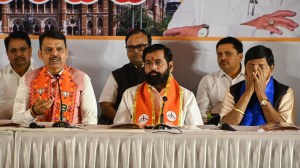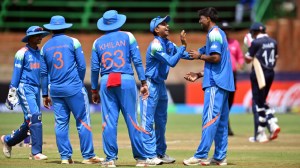Naipaul146;s challenge
The year 2005 will be remembered for, among other things, V.S. Naipaul8217;s milestone speech in which he challenged Indians to come up wit...

The year 2005 will be remembered for, among other things, V.S. Naipaul8217;s milestone speech in which he challenged Indians to come up with a contemporary intellectual discourse. Not since the great Bengal renaissance has there been a movement in India that does justice to our history, our social conditions, our aesthetic traditions, our literary canons and our political predicaments. The 20th century, was characterised by an excessive interest in matters political. One can date the beginning of this obsession to 1905: the partition of Bengal and the Swadeshi movement. Opposing British imperialism became an end in itself. And no movement that is solely focused on 8220;opposition8221; can generate constructive, creative impulses. The best exponents of the Bengal renaissance Rammohun Roy, Michael Madhusudan Dutt, Vivekananda, Bankim, Tagore were concerned with awakening and building, not merely criticising and opposing. It is from this intellectual tradition that today8217;s India should seek inspiration.
Drunk with the recent economic success, we may fall into the trap that intellectual, moral and aesthetic discourse is not important. The Prussian model which was obsessed with technological, military and economic successes, as ends in themselves, led to a hubristic denouement in 1945. Naipaul has explicitly warned us not to be seduced by the Prussian model. No organism society, nation, civilisation, call it what you will of the size of India with its tortured history and rich cultural tapestry can respond to the aspirations of its citizens by putting all its eggs in the basket of economic instrumentalism. A double digit rate of GDP growth is desirable and in our case even necessary. But it is not sufficient. Intellectual activity cannot be postponed till after we have achieved economic 8220;development8221;. The two processes have to be simultaneous, not sequential. A recent warning by a respected former Central banker, Bimal Jalan, that our economic growth rate could revert to proverbial Hindoo levels if the eco-system of our public policy is not fixed, should give us reason for pause. Once we have jettisoned crude violence as an option if for no other reason than that it failed the Prussians!, 8220;improvements8221; in public policy can come about only through public discourse.
The Bengali renaissance came up with definitive approaches to a range of activities that we refer to as 8220;culture8221;. Literature, history, music, painting, sculpture, religion, moral philosophy, political economy and social studies were all covered and an attempt was made to address the historical predicament of not just the Bengalis, but of the people of India in a manner remarkable for its energy, its honesty and the sheer exuberance of its multi-tonal talent. The individuals behind this movement were certainly influenced by the West. But they did not succumb to lazy imitation and acceptance of ideologies that had no relevance to their own environment. They were equally influenced by ancient and medieval Indian civilisation, by Adivasi traditions and by the plain fact of deprivation of every kind which haunted their countrymen during their own lifetimes. To these influences they applied the test of their own judgments; judgments arrived at after much thought and debate. If Indians exist today as one people under one set of laws with a modicum of shared aspirations, we owe it to the Bengali 8220;torch-bearers8221; of the 19th century.
To allow our national intellectual debate to be hijacked by post-modernists cocooned in exile as tenured professors in American universities or by adherents of totalitarian political traditions which have been discredited in their own homelands would be a great folly. The debate has to be in India and has to be undertaken by people with meaningful economic, political and cultural stakes in India. The vocabulary that governs this debate needs to be developed in India today. If Michael Madhusudan Dutt could create a 8220;new8221; language, so must we. By reaching out to both poetry and music Tagore created something new, but he also connected back to the traditions of Jaidev and Vidyapati. Before Bankim, there was no Indian novel. But his novels were not imitation European novels. He wove into them the tradition of the 8220;sutradhar8221;. Rammohun defended the Upanishads and condemned suttee. Vivekananda advocated activism as opposed to prevalent Hindoo lassitude, but he did it by harking back to Vedantic traditions, not by rejecting them. Daridra-narayana was a new contribution to a heartless caste-ridden society done with such finesse that no one notices its radical nature. Jamini Roy is the epitome of 8220;modernism8221; in art and his modernism is tied up with the Adivasi aesthetic experience. Notice that none of the Bengali greats regressed into blind veneration of re-interpreted versions of India8217;s past! Not one embraced narrow-minded chauvinism. Rammohun pleaded for English education. Tagore was even skeptical of the Swadeshi movement as he feared and rightly so that it appealed to atavism.
Our intellectual forbears have set us an example. In 2005, it is time we finally say goodbye to one hundred years of obsession with politics, especially the politics of opposition and confrontation. We must completely reject the mindset of discredited totalitarian ideologies we hope 8220;probasi8221; Bengalis take the lead and, who knows, Buddha-babu may still surprise us!. The discourse must cover every aspect of our emerging culture and ensure that it is a lively one embracing the outside world while seeking the well-springs of our collective unconscious and dealing with the continued prevalence of wretchedness for so many of our fellow-citizens 8220;they of the thin legs8221;. It is not an easy task. One of our finest directors, Shekhar Kapoor, made a film on Elizabeth I. It ends with the statement that in her lifetime, England changed from an unimportant country on the periphery of the continent to become Europe8217;s richest country. And we all know that England8217;s riches included poetry and drama in the same measure as her gold and her wool. It is up to us to decide if we wish to create an Elizabethan England or a Florence of the Medicis. Hopefully, we will not settle for a false paradise of the Prussian or Leninist kind.
The writer is chairman 038; CEO, MphasiS. Write to him at jerryraoexpressindia.com
- 01
- 02
- 03
- 04
- 05































